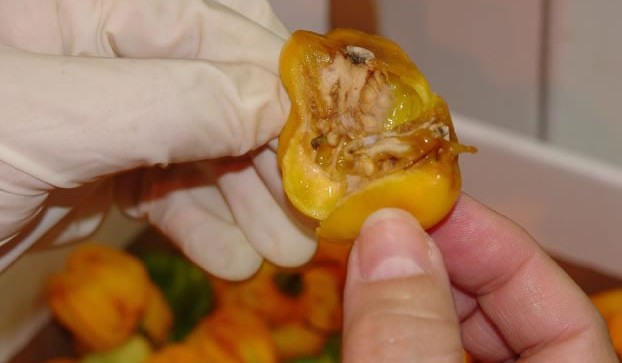GeneWatch UK today warned that planned experiments with genetically modified (GM) fruit flies in Brazil could lead to GM maggots in fruit being illegally imported to Britain and other countries.

Experiments involving open releases of millions of genetically modified (GM) Mediterranean fruit flies (Ceratitis capitata) into fruit orchards in Brazil were approved by Brazil’s GM regulator CTNBio in April (1). The date for the planned experiments has not yet been announced.
When released, the GM fruit flies are expected to mate with wild flies and produce female offspring which fail to reach adulthood, with many dying as maggots in the fruit. This is intended to reduce the wild population on Mediterranean fruit flies, which are a pest which feeds on many types of fruit. To reduce the wild population it must be outnumbered by a factor of at least ten to one, requiring many millions of GM fruit flies to be released.
Brazil exports fruit including melons, mangoes, grapes, apples, papayas and plums worldwide, with Europe as a major market. In 2013, the British and Dutch made almost two thirds of purchases, followed by Spain, the U.S., Germany, Portugal, France, Uruguay, the UAE, Canada, Bangladesh, Italy and Argentina (2).
In Europe, food containing genetically modified organisms (GMOs) is legally required to be safety tested and labelled, however no specific procedures have been adopted to identify GM maggots in fruit imports. Live GM flies could also be transported in the fruit as the genetic killing mechanism affects only female flies.
Notes for Readers:
(1) The minutes for CTNBio’s meeting on 10th April 2014 are on: www.ctnbio.gov.br/upd_blob/0001/1880.pdf
Portuguese original:
3. Liberação Planejada no Meio Ambiente – Resolução Normativa nº 06 de 6/11/2008
3.1. (URGENTE)
Organização Social Biofábrica Moscamed Brasil. Processo 01200.000073/2013-31. (Atendimento à Diligência) Liberação Planejada no meio ambiente intitulada: “Estudo de avaliação de Ceratitis capitata transgênica com objetivo de redução populacional da praga em áreas de fruticultura de Juazeiro, Bahia” ̈(RN6). Data de protocolo: 13/12/2012. Extrato Prévio nº 3462/2013 publicado em 17/01/2013. Relator definido em julho/2013 fevereiro/2014: Dra. Maria José Vasconcelos e Dra. Luciana Pimenta Ambrozevicius Dr. Francisco Aragão. Assesso r: Gutemberg D. Sousa;
DEFERIDO
Unofficial translation:
3 Release Planned in Environment – Normative Resolution No. 06, 6/11/2008
3.1. (URGENT)
Social organization Biofactory Moscamed Brazil. 01200.000073/2013-31 process. (Call to Diligence) Planned Release on the environment entitled: “Evaluation study of transgenic Ceratitis capitata population in order to reduce pest in fruit-growing areas of Juazeiro, Bahia” ̈ (RN6). Date of registration: 13/12/2012. Previous Extract No. 3462/2013 published on 1/17/2013. Rapporteur defined in julho/2013 fevereiro/2014: Dr. Maria José Vasconcelos and Dr. Luciana Pimenta Ambrozevicius Dr. Francisco Aragon. Assesso r: Gutenberg D. Sousa;
GRANTED
(2) Tropical triumph for Brazilian fruit exports. Fresh Fruit Portal. 23rd January 2014.



















…So all the ‘wild’ fruit flies destroyed, leaving the world with GMO fruit flies?
Similar to what happened in US with our Lady Bugs [Red] being overpowered by the Asian ones [Orange] which bite us and stink when hit. Red ones were beneficial, who knows if Orange ones are. Haven’t seen a red Lady Bug in years now. Orange ones are Super Abundant.
I’ve actually seen some red ones here in GA. But the orange HAVE been appearing more often lately. =T
I’m not clear on why importing infertile maggots is a bigger menace than importing fertile maggots.
How is this suppose to help us? I’m so sick and tired of all GM anything!!! Can’t we just go back to living in a natural world instead of letting Monsanto and other Big Buissnesses having to make a buck on everything calling it better for us?! No we have foreign bugs? Stop trying to end the world before it’s time to end!!!!
I couldnt agree with u more!!!!!!
Exactly!!!
So who’s supposed to eat this maggot filled fruit?
all fruit already has maggots and eggs in it…why do you think your overripe bananas can get fruit flies when it’s winter and freezing outside? because they came in with the fruit duh, something that would be even more obvious if most fruit wasn’t refrigerated…slowing down the growth of the infant fruit.
En Chile estamos preocupados porque nuestros gobiernos no han querido decir donde se plantan los transgenicos y sus convenios los han hecho en forma oculta y no sabemos si lo que compramos y comemos son transgenicos.